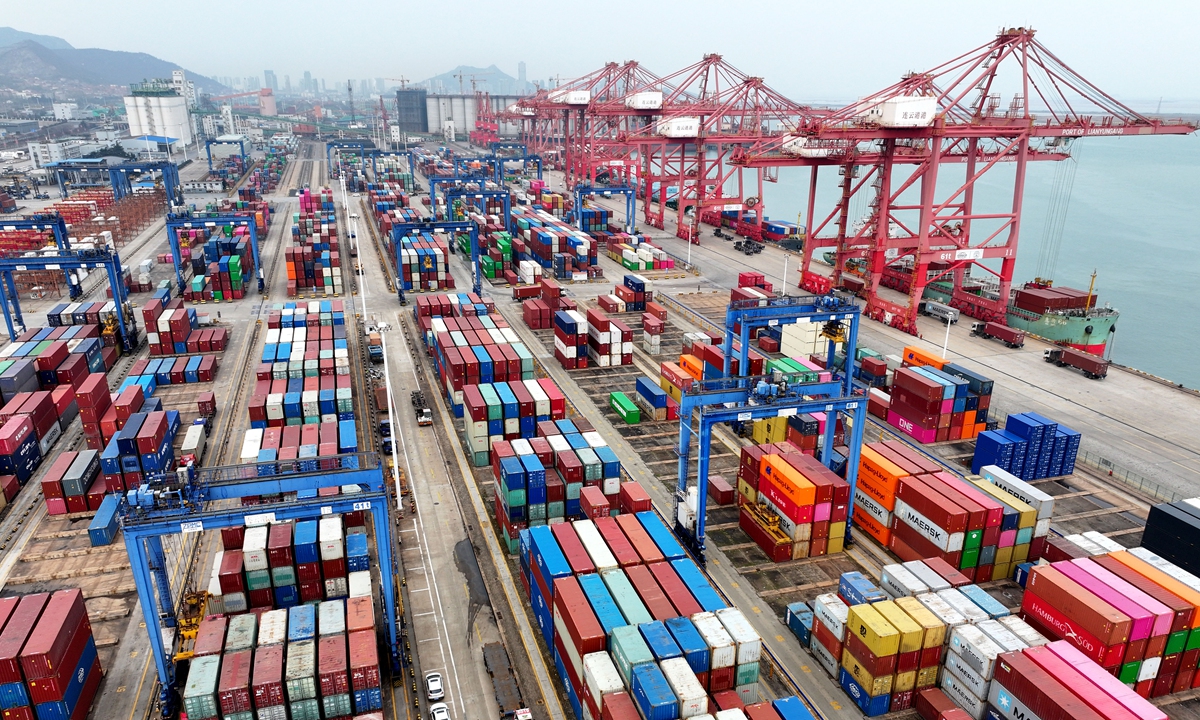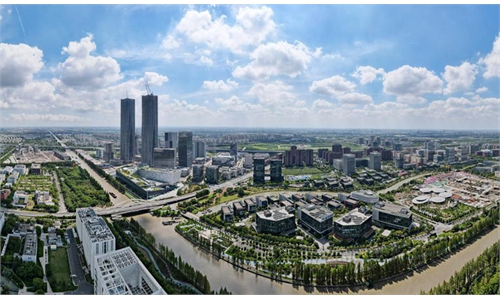
Aerial photo taken on May 7, 2025 shows containers at the Lianyungang Port in Lianyungang City, East China's Jiangsu Province. Photo: VCG
China and the US made substantive progress in the Geneva trade talks. The recent tariff rollback represented a positive step, reflecting China's continued commitment to de-escalating trade tensions and safeguarding global economic stability amid US political complexities. Beijing demonstrated flexibility and responsibility by supporting global supply chains and strategic sectors.
Despite escalating geopolitical tensions in recent years, the economic relationship between the US and China remains highly resilient. Even with trade disputes and Washington's attempts to curb Chinese influence, Beijing has successfully maintained intricate economic ties with the American market that are difficult to unravel easily.
This relationship is best described as "competitive cooperation." Competition is intensifying in the technology and clean energy sectors, where China is making significant strides, while mutual dependence continues in trade and global supply chains where China plays a vital role.
The idea of a complete economic "decoupling" between the US and China remains unrealistic and unsustainable, given the intricate web of intertwined interests and the complexity of global supply chains.

Ahmed Abdellah Faris Photo: Courtesy of Ahmed Abdellah Faris
Despite Western calls to reduce reliance on China in certain sectors, economic indicators confirm the continued robust pace of trade and investment partnerships between the two sides.
In light of the profound transformations sweeping the global economy, the return of the US to multilateral trade cooperation frameworks appears essential. However, this hinges on a shift away from its unilateral and protectionist policies, which have destabilized the trade system and exacerbated supply chain crises. Washington's continued reliance on bilateral confrontations threatens market stability and erodes confidence in the existing order, making a return to a fair and balanced approach necessary to ensure sustainable global growth.
The US itself is bearing significant costs. Tariffs have driven up prices for US consumers, especially for electronics, vehicles, and apparel. Production costs have risen for American manufacturers reliant on global inputs. The result: rising inflation, declining consumer confidence, and weakened competitiveness for US exporters. Recent data showed a 0.3-percent contraction in the first quarter of 2025, raising fears of stagflation.
With 70 percent of global output depending on cross-border supply chains, protectionist policies only magnify systemic risks.
Tariff tensions also threaten the global green transition. Green technologies are heavily reliant on complex global supply networks. Trade barriers raise costs, delay deployment of clean energy, and risk excluding developing countries from green growth. While some tariffs may aim to boost domestic industry, the broader effect is negative, hampering progress in addressing climate change.
Amid this turbulence, China continues to play a stabilizing role. Its 2024 GDP grew by 5 percent, contributing 30 percent to global growth. With robust policy coordination, China is advancing high-tech manufacturing, boosting domestic demand, and expanding external trade networks. Its exports to the US now account for only 14.7 percent of total exports, underscoring growing diversification.
Also, China is playing an increasingly vital role in fostering a stable and rules-based global trading environment.
Through initiatives like the Belt and Road and various free trade agreements, China has become a key partner for Global South nations and a crucial financier of infrastructure. Furthermore, it holds a pivotal position in global supply chains, particularly in the energy and mineral sectors.
China's modernization path rejects zero-sum logic. It promotes shared development, deeper trade ties, and institutional openness. With 23 free trade agreements and partnerships across 30 countries and regions, China remains committed to high-level opening-up.
China presents itself as a staunch advocate for free trade and the multilateral system, countering Western protectionist tendencies. In defending its economic interests, China is also speaking for developing economies at large - resisting unilateralism, protecting global rules, and fostering resilience in an increasingly uncertain world.
The author is a researcher at the Center for Arab-Eurasian Studies in Egypt. bizopinion@globaltimes.com.cn



